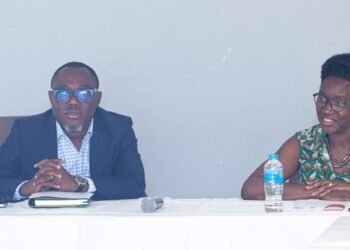The African Development Bank, Making Finance Work for Africa (MFW4A) and the German Cooperation (BMZ/GIZ) held a two-day international workshop in Frankfurt, Germany, to improve participants’ understanding of trade financing in Africa.
The workshop, themed: “The Consolidation of International Correspondent Banking Relationships in Africa,” was attended by representatives of the main correspondent banks operating in Africa – Commerzbank, Deutsche Bank, Standard Chartered Bank, standard-setting bodies (FSB, SWIFT, GLEIF) and other international stakeholders. Its purpose was to discuss solutions to trade finance challenges in Africa.
“The Bank has always been a champion of trade finance as we view it as an important catalyst for economic growth and poverty reduction,” Yaw Kuffour, Manager of the Bank’s Trade Finance Division said. Kufuor added that since the Bank launched a trade finance initiative 10 years ago, it has seen a significant reduction in barriers to its access. The initiative also seeks to foster sustainable partnerships in pursuit of greater access to finance for local banks and their clients.
The event highlighted the importance of understanding the constraints that limit growth in the trade finance portfolios of banks in order to benefit policy makers. These have been cited as lack of sufficient risk capital, competition, limits with correspondent banks, forex liquidity, regulatory restriction, and staff capacity.
MFW4A launched a Trade Finance Initiative (TFI) with support from the Bank and GIZ in early 2018, to raise awareness, promote regulatory compliance, and to build the capacity of local banks to introduce sophisticated products and grow their trade finance business.
“To underline how important trade is to economic growth and employment, this event seeks to do two things. Firstly, foster dialogue between important trade finance actors and secondly, drive solutions on how to reduce the trade finance gap in Africa,” Wolfgang Buecker, Head of GIZ’s Financial Sector Development Programme stated.
Highlighting a key outcome of the workshop, David Ashiagbor, MFW4A Partnership Coordinator commented, “Priorities have been identified, and support has been mobilized to build trade finance capacity in local banks and improve the risk perception of African financial systems and curtail the reduction in correspondent banking relationships”.
Participants underlined the need to enhance institutional collaboration, scale up technical assistance, and promote non-traditional source of funds while leveraging digital technologies and innovations to boost international, intra-regional and domestic trade finance in Africa.
The workshop was held 13-14 June.
Source: African Development Bank Group (AfDB)





























































